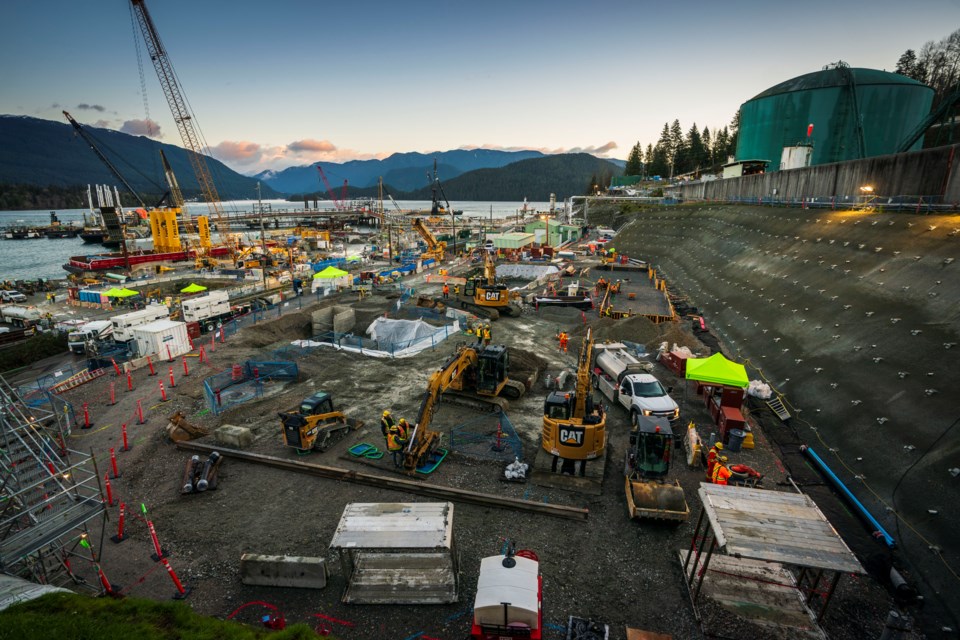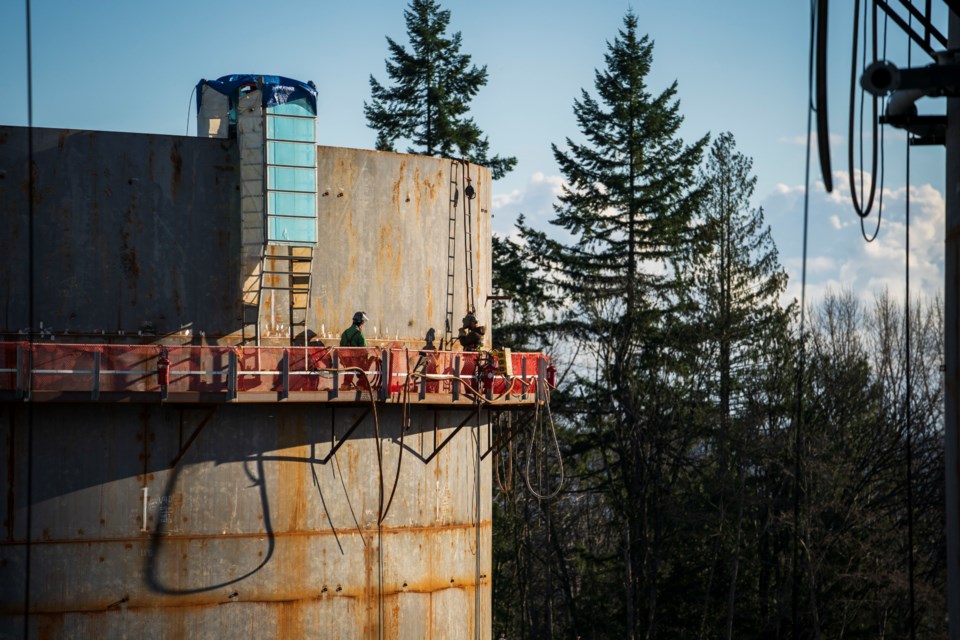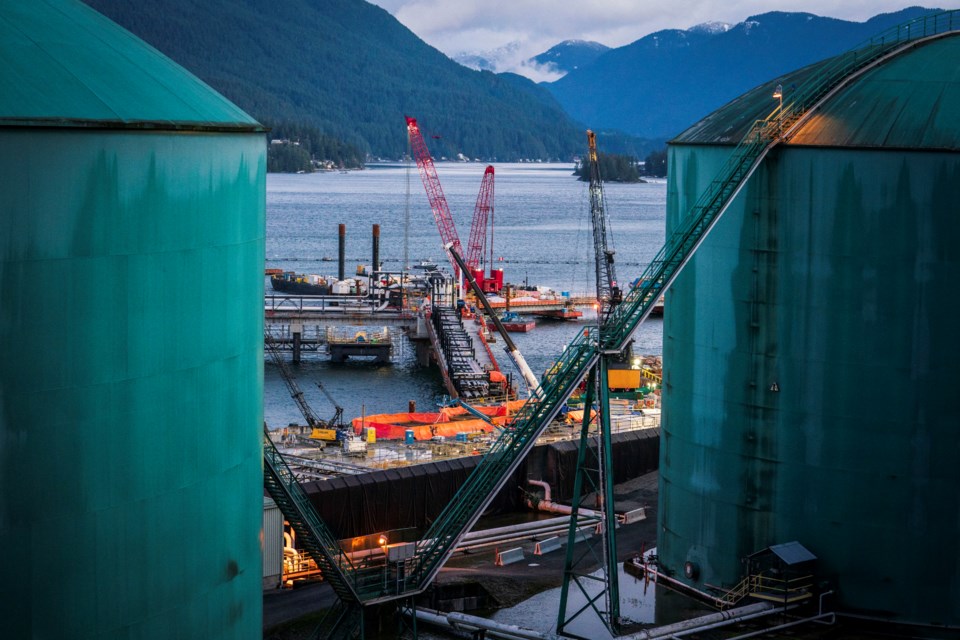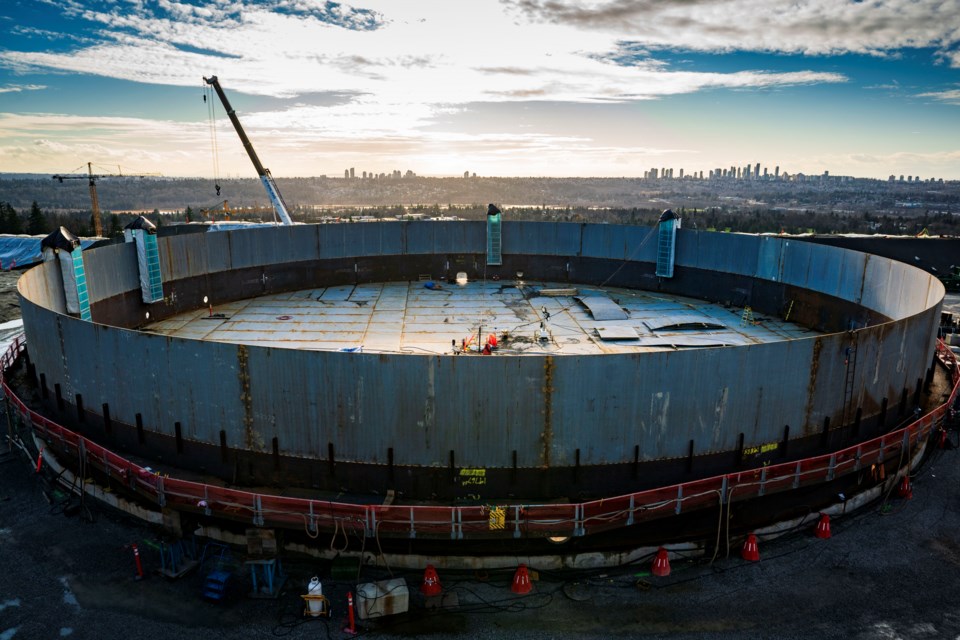Last week, as gasoline prices spiked in Vancouver to reach $2.20 per litre—48 cents above the national average—crude oil from Alberta began filling the new secondary Trans Mountain pipeline and making its way out west, to Burnaby.
The 1,150-kilometre, government-owned Trans Mountain pipeline expansion project is complete and officially in commercial operation. It was given the official green light by the Canadian Energy Regulator (CER) on April 30 with a “leave to open.”
By the end of this month, oil tankers laden with crude oil from the new line should be leaving Westridge Marine Terminal in Burnaby for California and Asia.
“Although we’re shipping oil and the pipeline is complete, there is still probably another year’s worth of work in terms of restoration on the right-of-way,” said Mike Davies, COO of Trans Mountain Corp., a federal Crown corporation.
The twinning project expanded the pipeline’s capacity from 300,000 to 890,000 barrels per day (bpd), with 500,000 bpd earmarked for export.
Whether slightly-lower wholesale prices for gasoline and diesel in B.C. will eventually result from the additional pipeline capacity—as some analysts have suggested—remains to be seen.
Given the scale and cost of the project—$34 billion and five years under construction—the official commissioning on May 1 was a subdued affair. There was no ribbon-cutting or photo op, and Natural Resources Minister Jonathan Wilkinson declined to even comment on the occasion of the expansion’s completion.
As the project has been a magnet for anti-fossil fuel activism, it may be that Prime Minister Justin Trudeau’s government simply doesn’t want to attract attention to the controversial project.

“I think, at this stage, a lot of people have learned that you don’t necessarily want to draw a lot of attention to these types of projects,” said oil market analyst Rory Johnson.
Alberta Premier Danielle Smith and Alberta Minister of Energy and Minerals Brian Jean thanked the federal government for completing the project.
“Our province wants to congratulate the Trans Mountain Corporation for its tenacity to have completed this long awaited and much-needed energy infrastructure, and to thank the more than 30,000 dedicated, skilled workers whose efforts made this extraordinary project a reality,” they said in a joint statement. “The province also wants to thank the federal government for seeing this project through.
“We are excited that Canada’s biggest and newest oil pipeline in more than a decade can now bring oil from Edmonton to tidewater in B.C. This will allow us to get our energy resources to Pacific markets, including Washington State and California, and Asian markets like Japan, South Korea, China and India. Alberta now has new energy customers, and tankers with Alberta oil will be unloading in China and India in the next few months.”
The Trudeau government itself may be downplaying the project because there is little political currency in it.
“Since taking office in 2015, climate policy has been a centerpiece of the Trudeau Liberals’ policy portfolio,” said Kent Fellows, an economist at the University of Calgary’s School of Public Policy.
“So on TMX they are caught between two extremes—one extreme that, ignorantly, sees no value in continued fossil fuel production and sees any support for that industry as a blight on Canada’s socio-economic status, and another extreme that won’t support any action on climate change or environmental concerns if it comes with a cost.
“Add to that the potentially embarrassing cost overruns, and TMX has tragically become a source of shame rather than one of pride, its economic value notwithstanding.”
Blair King, a chemist who blogs about energy and environmental issues, wrote a number of critiques of the arguments made against the pipeline expansion, including the economic case.
“I am glad the project is almost over and am absolutely sure that this will be the last major inter-provincial pipeline built in Canada,” he told BIV.
“That being said, I am confident that the project will be a winner for the Canadian and Albertan economy. The increased price reduces the value, but the increase in royalties and the value this project will create in improved sales of existing production will ensure the pipeline remains a valuable asset.”
Environmental groups find nothing to celebrate with the new pipeline going into operation.
“We just can’t understand why Canadians taxpayer dollars are spent on doubling a pipeline instead of going into the things that help us reach a low-carbon economy,” said Jay Ritchlin, director general for the David Suzuki Foundation, which was one of several environmental groups that opposed the project on three main environmental grounds: Increased greenhouse gas emissions from expanded oil sands operations, increased risk of marine oil spills and impact on killer whales from increased tanker traffic.
The price tag—$34 billion—adds insult to injury.

“I think it just emphasizes what a poor use of Canadian tax dollars that was in the midst of a climate emergency,” Ritchlin said.
“Pressure groups challenged every aspect of this project in the courts, yet it passed muster in every single case,” said Stewart Muir, executive director of Resource Works.
“Despite controversies and cost overruns, the project as we have it today is financially healthy and will contribute positively to Canada’s economic, environmental and energy strategies in the coming decades.”
Bridgitte Anderson, CEO of the Greater Vancouver Board of Trade (GVBOT), said the Trans Mountain expansion was one of four energy mega-projects in B.C. that pumped $80 billion into the B.C. economy over the last decade—the other being the Site C dam, LNG Canada and Coastal GasLink pipeline.
“It has been a long road, but we are pleased to see the Trans Mountain pipeline commissioning,” Anderson said. “The expansion will ensure Canada gets full value for its oil and allow us to reinvest the benefits to a build a more resilient and prosperous economy.”
A tortured history
Alberta oil producers, confined largely to the U.S. market, have long sought pipelines with tidewater access so they could export oil to markets other than the U.S. The Trans Mountain expansion was one of two pipeline proposals that would have brought Alberta oil to the West Coast of B.C.
When the then-new Trudeau government approved the pipeline’s expansion in 2016, it simultaneously killed the Northern Gateway pipeline project. TMX then quickly got bogged down in regulatory, legal and political quicksand to the point where the original proponent—Kinder Morgan (NYSE:KMI)—walked away in frustration, prompting the federal government to step in and take on the project itself.
The original Trans Mountain pipeline was built in 1951. A batched pipeline, it can move either crude oil or refined fuels such as gasoline and diesel. It supplies the Parkland Corp. (TSX:PKI) refinery in Burnaby, as well as refineries in Washington state, with crude.
There is some hope that additional pipeline capacity will mean more refined fuels flow from Edmonton to B.C., and thus lower the wholesale price of gasoline and diesel in the province.
In 2013, Kinder Morgan estimated the pipeline twinning project would cost $5.4 billion and would have an in-service date of December 2019. When the company made its final investment decision in 2017, the estimated capital cost was $7.4 billion.
But the project was subject to one delay after another, from court challenges, regulatory hurdles and natural disasters, including massive flooding in November 2021. Kinder Morgan had estimated that every month of delay meant a loss of $75 million in earnings.
The project was vigorously opposed by environmental groups, a number of First Nations—notably the Tsleil-Waututh—and John Horgan’s BC Green Party-backed NDP government.
It was the Horgan government’s attempts to halt the pipeline that appear to have been the last straw for Kinder Morgan. In the spring of 2018, the company halted work on the project and gave the federal government an ultimatum: Sort out who, between the federal and B.C. governments, was in charge, and provide assurances the pipeline could be built—or it would walk.
“A private party simply doesn’t have the power to resolve differences between governments,” Kinder Morgan Canada CEO Steve Kean said at the time.
The Trudeau government ultimately bought the existing Trans Mountain pipeline for $4.4 billion and agreed to finish the twinning project, which at the time was still estimated to cost $7.4 billion.
The plan was to sell the pipeline to a third party once it was built. That is still the plan, and a number of First Nations groups have expressed interest in buying the pipeline.
Johnson doesn’t think any sale will happen until after September, which is when the CER is expected to make a final decision on what the final tolls—fees paid to use the pipeline—will be.
“I wouldn’t expect there to be a sale before final decisions were made on tolls,” Johnson said.
He added the federal government will likely have to take a “haircut”—in other words, a substantial write-down—on the pipeline.

Economic benefits
As for the economic benefits of the project, building the second line and expanding the Westridge Marine Terminal and tank farm in Burnaby generated thousands of construction jobs in B.C. and Alberta.
The expansion adds 500,000 bpd of export capacity. The federal government has estimated this added export capacity will generate $73 billion in increased revenues for Alberta producers over 20 years.
It also estimated the project would generate $46 billion in government revenues over the course of construction and the first 20 years of operation: $5.7 billion for B.C., $19.4 billion for Alberta and $21.6 billion in federal revenue.
The project has employed 35,000 workers, Davies said, with a peak workforce of 15,000 in 2023. First Nations along the pipeline route signed mutual benefits agreements worth a total of $657 million over 20 years, and the project spent $4.8 billion in contracts awarded to some 6,000 Indigenous contractors.
Davies said the first exports of oil from the new line should start leaving Westridge Marine Terminal by the end of this month, with California being one of the bigger markets.
“California will be an important market,” he said. “So will Asia.”




